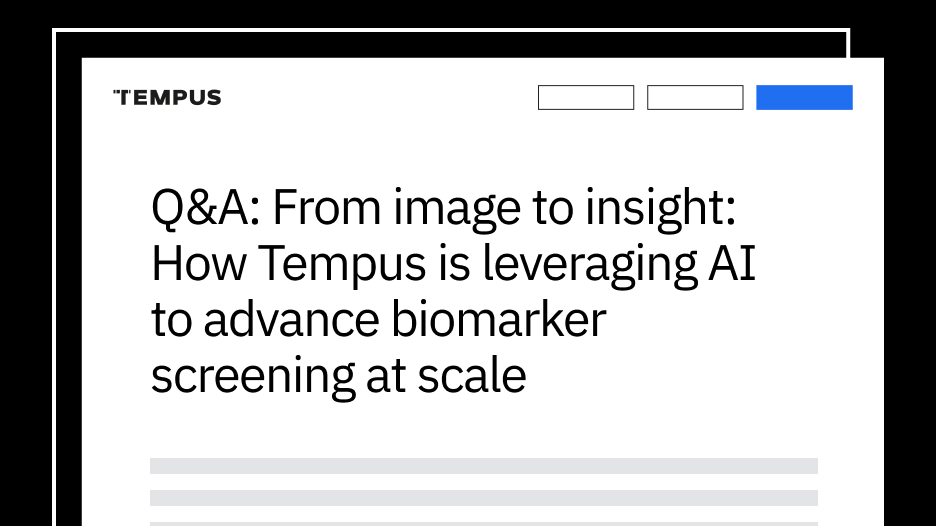-
PROVIDERS
New MRD Medicare Coverage for Select Indications*
*When coverage criteria are met. Additional criteria and exceptions for coverage may apply.
-
LIFE SCIENCES
Learn more
Building the engine to scale data abstraction through AI
Learn how Tempus’ AI engine transforms unstructured clinical text into analysis-ready real-world data -
PATIENTS
It's About Time
View the Tempus vision.
- RESOURCES
-
ABOUT US
View Job Postings
We’re looking for people who can change the world.
- INVESTORS
10/20/2025
Improving patient matching efficiency with an AI-powered platform
An AI-powered screening tool helped increase trial matching efficiency by identifying the right patients for review, screening out ~72% of ineligible patients from the initial pool.
Authors
Chelsea Osterman
Senior Medical Director, Tempus

Arpita Saha
VP, Applied AI and Research, Tempus

Senior Medical Director, Tempus

Arpita Saha
VP, Applied AI and Research, Tempus

Background
Health systems and academic medical centers face a significant challenge in clinical trial enrollment: efficiently identifying eligible patients. The manual review of patient records is time-consuming and difficult to scale, especially when critical information is buried in unstructured data like clinical notes. This screening bottleneck limits a site’s ability to connect patients to trials within their window of eligibility and hinders the overall success of a research program. Improving access to treatment options requires a more efficient way to screen high volumes of patients against complex trial criteria.
The challenge: Scaling patient screening while maintaining precision
The challenge for research sites is scaling patient screening while maintaining precision. As the number of trials and the complexity of their criteria grow, research staff are burdened with the meticulous and time-consuming task of manual record review. To maximize enrollment and improve patient access to novel therapies, sites need a solution to:
- Prioritize the patients for pre-screening that are the most likely to be eligible for a trial.
- Present key patient information in a digestible summary, including links to source documentation for easy confirmation and review.
- Create a scalable, sustainable workflow that can support continued growth.
A research site’s goal is to maximize the efficiency and impact of its clinical screening staff. This allows them to focus their expertise on the patient candidates most likely to qualify and identify the best possible trial matches.
Tempus AI’s approach: Deploying Patient Query
Tempus deployed an AI agent called Patient Query to address this challenge. Patient Query functions as an intelligent agent1 that automates the labor-intensive step of patient evaluation by allowing users to easily gain insights from unstructured data across patient records at scale
Tempus’ Approach
- Automated record analysis: The Patient Query agent leverages generative AI to read and interpret unstructured data within patient records, including clinical notes and reports.
- Intelligent scoring: The tool compares patient data against specific trial inclusion and exclusion criteria and assigns a relevance score to each patient.
- Prioritized work queues: Patients who score above a trial-specific threshold2 are automatically prioritized, allowing reviewers to focus on a smaller, more viable cohort of potential candidates.
This solution was developed and deployed rapidly by leveraging the core capabilities of the Tempus OS, including Agent Builder for prompt iteration and Applied AI models for the underlying analysis.
Example Patient Query output
Patient reviewers can see the agent’s reasoning and links to the primary source documentation to rapidly confirm the Patient Query output.
No real patient data used in this demo.
Measurable Outcomes
The deployment of Patient Query to prioritize patient queues for review led to immediate and measurable improvements in operational efficiency and pre-screening effectiveness. Across 8 trials using the tool for at least 30 days, we evaluated 9,875 patients.3
- Efficiently prioritized patients for clinical screening: Patients above the threshold who were pre-screened by Tempus nurses had higher rates of passing eligibility criteria than those below the screening threshold.
- Avoided unnecessary reviews: Patient Query helped increase efficiency by allowing nurses to prioritize patients that are most likely to be a match. For the 8 trials assessed, the tool appropriately screened out ~72% of patients that are not currently eligible from the initial pool.
- Allowed patient screening to scale: Prioritization of patient review using Patient Query allowed nurses to focus their time on reviewing the most viable candidates for potential match.
|
Key initial results
|
A further evaluation at a query level was performed to understand the efficacy of these queries in identifying specific patient characteristics. Out of a total of 196 queries reviewed, the overall accuracy across all queries was 94.39%, with individual query accuracies ranging from 84.62% to 100.00%.
Sample queries assessed:
- Does the patient have a diagnosis of non-squamous non-small cell lung cancer (NSCLC)?
- Does the patient have a diagnosis of non-small cell lung cancer (NSCLC) that is any of the following: stage IIIB, stage IIIC, stage IV, or distant metastatic?
- Does the patient have non-small cell lung cancer (NSCLC) with a PD-L1 tumor proportion score (TPS) of less than 50%?
- Has the patient received any systemic therapy for metastatic non-small cell lung cancer (NSCLC)?
|
“With the help of Patient Query, prioritization of our patient lists has never been easier. By being able to sort the most likely matches to the top of the list, we can effectively screen out people who are not eligible for trials. This has substantially reduced how much time and effort we put into unlikely matches.” – Alison McDaniel BSN, RN, OCN, Oncology Research Nurse, Tempus AI |
The Tempus OS advantage: A platform built for scalable solutions
The success of Patient Query is enabled by the Tempus OS, an integrated platform that connects data, analytics, and AI-powered applications. Tempus has established secure EMR integrations at many sites today, creating the infrastructure needed to deploy agentic pre-screening tools like Patient Query directly into site workflows. This foundational technology works to identify patients for any use case where precision matters, powering applications like our TIME Trial Network, Tempus Link for trial pre-screening and matching, Tempus Next for addressing care gaps, and the Tempus One clinical assistant. By partnering with Tempus, your institution can leverage this platform to turn complex data into actionable insights and accelerate your research program.
Deploying Tempus OS establishes a secure environment to support the safe and efficient transfer of data and solutions like Patient Query
| Unlock growth and efficiency for your research program with Tempus AI. To learn more about our clinical trial matching services, click here. |
1. Agents in this article refer to AI tools deployed through Tempus platforms that use generative AI to answer questions based on their intended use.
2. The screening threshold is established individually for each trial and only after screening patients across all scores to ensure accuracy.
3. Internal data on file.
-
01/20/2026
From image to insight: How Tempus is leveraging AI to advance biomarker screening at scale
By leveraging Paige Predict to screen for genomic and phenotypic biomarkers, clinicians and researchers have rapid access to valuable information to prioritize testing and pre-screen patients at scale.
Read more -
12/04/2025
Pioneering decentralized oncology trials: Success at the nation’s largest community practices
Hear directly from industry leaders and pioneering site partners as they share insights on expanding their research footprint and improving financial sustainability for their institutions.
Watch replay -
11/06/2025
Beyond imaging: Leveraging molecular tools to detect MRD for personalized cancer care
This webinar explores the clinical value of MRD testing and IO treatment response monitoring in oncology, using real-world cases to illustrate its application in patient management.
Watch replay



